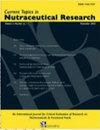Hispolon对七氟醚诱导的HT-22细胞模型术后认知功能障碍的保护作用
IF 0.4
4区 医学
Q4 NUTRITION & DIETETICS
Current Topics in Nutraceutical Research
Pub Date : 2023-07-07
DOI:10.37290/ctnr2641-452x.21:260-265
引用次数: 0
摘要
吸入麻醉剂七氟醚导致神经元凋亡、氧化应激和认知障碍,导致术后认知功能障碍。Hispolon是一种天然多酚,据报道具有抗癌、抗糖尿病、抗氧化、抗病毒和抗炎活性。然而,它在调节七氟醚刺激的神经元毒性方面的功能仍有待研究。为此,我们使用七氟醚处理的HT22细胞作为术后认知功能障碍的模型,研究了组蛋白蛋白的作用。我们的研究结果显示,七氟醚诱导的HT22细胞线粒体功能障碍、氧化应激、细胞毒性和凋亡的增加减少。总之,这些数据表明,组蛋白可能是治疗术后认知功能障碍的潜在药物。本文章由计算机程序翻译,如有差异,请以英文原文为准。
Protective Effect of Hispolon on Postoperative Cognitive Dysfunction in a Sevoflurane-Induced HT-22 Cell Model
Inhalation of the anesthetic sevoflurane leads to neuronal apoptosis, oxidative stress, and cognitive disorders, resulting in post-operative cognitive dysfunction. Hispolon, a natural polyphenol from Phellinus linteus, has been reported to exhibit anticancer, antidiabetic, antioxidant, antiviral, and anti-inflammatory activities. However, its functions in modulating sevoflurane-stimulated neuronal toxicity remain to be examined. To this end, using sevoflurane-treated HT22 cells as a model of postoperative cognitive dysfunction, we have examined the effect of hispolon. Our results show a diminution of the sevoflurane-induced rise in mitochondrial dysfunction, oxidative stress, cell toxicity, and apoptosis in HT22 cells by hispolon. In conclusion, these data suggest that hispolon may be a potential drug for treating postoperative cognitive dysfunction.
求助全文
通过发布文献求助,成功后即可免费获取论文全文。
去求助
来源期刊
CiteScore
1.10
自引率
0.00%
发文量
36
审稿时长
>12 weeks
期刊介绍:
Current Topics in Nutraceutical Research is an international, interdisciplinary broad-based peer reviewed scientific journal for critical evaluation of research on chemistry, biology and therapeutic applications of nutraceuticals and functional foods. The major goal of this journal is to provide peer reviewed unbiased scientific data to the decision makers in the nutraceutical and food industry to help make informed choices about development of new products.
To this end, the journal will publish two types of review articles. First, a review of preclinical research data coming largely from animal, cell culture and other experimental models. Such data will provide basis for future product development and/or human research initiatives. Second, a critical evaluation of current human experimental data to help market and deliver the product for medically proven use. This journal will also serve as a forum for nutritionists, internists, neurologists, psychiatrists, and all those interested in preventive medicine.
The common denominator of all of the topic to be covered by the journal must include nutraceuticals and/functional food. The following is an example of some specific areas that may be of interest to the journal. i) Role of vitamins, minerals, antioxidants and phytonutrients on cardiovascular health, cancer, diabetes, ocular health, mental health, men’s health, women’s health, infant nutrition, ii) Role of herbals on human health, iii) Dietary supplements and sleep, iv) Components of diet that may have beneficial effect on human health, v) regulation of apoptosis and cell viability, vi) Isolation and characterization of bioactive components from functional foods, vii) Nutritional genomics, and viii) Nutritional proteomics.

 求助内容:
求助内容: 应助结果提醒方式:
应助结果提醒方式:


